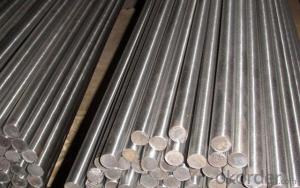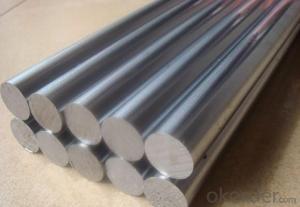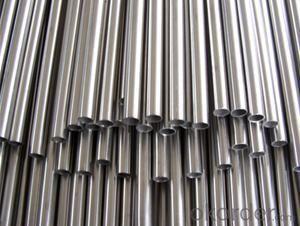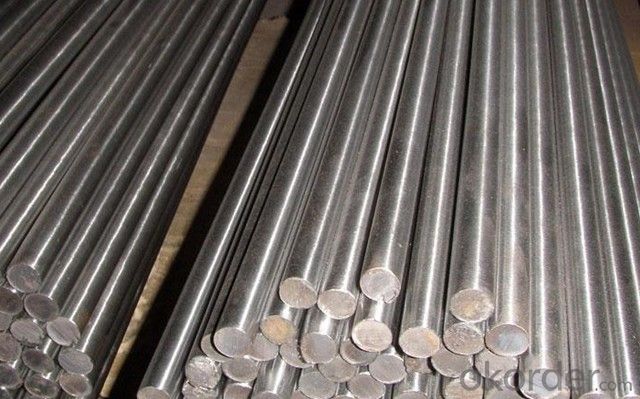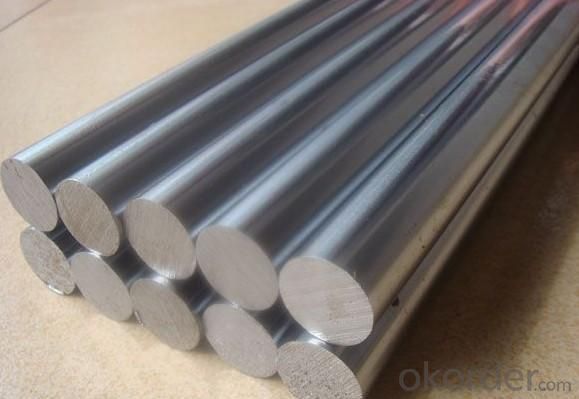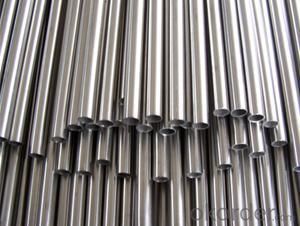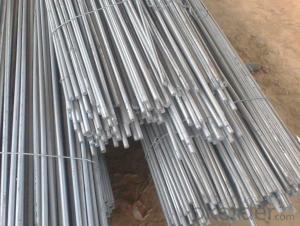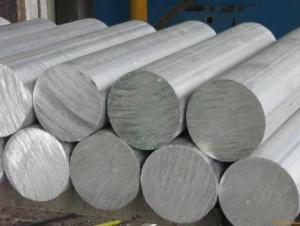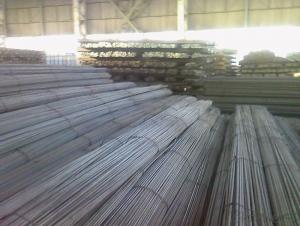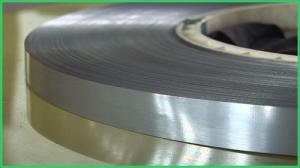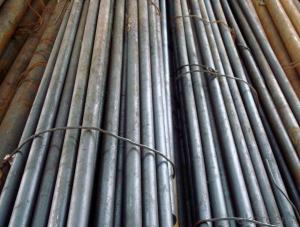Hot Rolled Spring Steel Round Bar 22mm with High Quality
- Loading Port:
- Shanghai
- Payment Terms:
- TT or LC
- Min Order Qty:
- 20 m.t.
- Supply Capability:
- 500 m.t./month
OKorder Service Pledge
OKorder Financial Service
You Might Also Like
Product Description:
OKorder is offering Hot Rolled Spring Steel Round Bar 22mm with High Quality at great prices with worldwide shipping. Our supplier is a world-class manufacturer of steel, with our products utilized the world over. OKorder annually supplies products to European, North American and Asian markets. We provide quotations within 24 hours of receiving an inquiry and guarantee competitive prices.
Product Applications:
Hot Rolled Spring Steel Round Bar 22mm with High Quality is widely used to make the bearing used in automobile, tractor engine, transmission and the wheel. And it also used to make the main bearing for the machine tools, electrical machinery, mining machinery, electric locomotives,mechanical ventilation and high speed of grinding wheel spindle etc
Product Advantages:
OKorder's Hot Rolled Spring Steel Round Bar 22mm with High Quality are durable, diversified and qualified.
Main Product Features:
· Premium quality
· Prompt delivery & seaworthy packing (30 days after receiving deposit)
· Can be recycled and reused
· Mill test certification
· Professional Service
· Competitive pricing
Product Specifications:
Manufacture: Hot rolled
Grade: 20CrNiMoA 20CrNi2MoA 16Cr2Ni4MoA 12Cr2Ni3Mo5A 20Cr2Ni4A 20Cr2Ni2MoA
Cr4Mo4V Cr15Mo4 W9Cr4V2Mo W18Cr4V W6Mo5Cr4V2 5CrMnMo 60CrMnMoNi 37CrA 55SiMoVA etc
Certificates: ISO, SGS, BV, CIQ
Length:6m 8m 9m 12m
Packaging: Packed in bundles with standard export sea-worthy package or as customer require
FAQ:
Q1: Why buy Materials & Equipment from OKorder.com?
A1: All products offered byOKorder.com are carefully selected from China's most reliable manufacturing enterprises. Through its ISO certifications, OKorder.com adheres to the highest standards and a commitment to supply chain safety and customer satisfaction.
Q2: How do we guarantee the quality of our products?
A2: We have established an advanced quality management system which conducts strict quality tests at every step, from raw materials to the final product. At the same time, we provide extensive follow-up service assurances as required.
Q3: How soon can we receive the product after purchase?
A3: Within three days of placing an order, we will begin production. The specific shipping date is dependent upon international and government factors, but is typically 7 to 10 workdays.
Q4: How many types of bearing steel that OKorder.com can supply?
A4: Two types, carbon spring steel and alloy spring steel
Images:
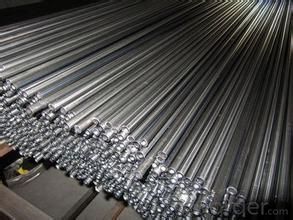
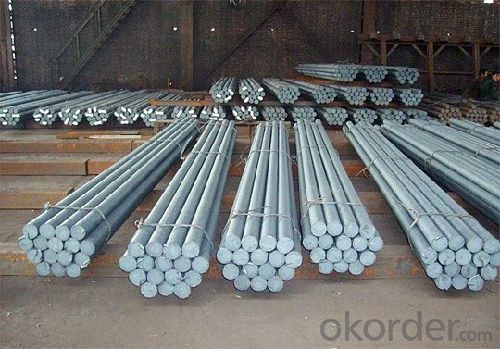
- Q: How does special steel contribute to the electronics industry?
- Special steel contributes to the electronics industry by providing highly durable and corrosion-resistant materials for the manufacturing of various electronic components. It is used in the production of connectors, circuit boards, magnetic cores, and other critical parts of electronic devices. Its unique properties enhance the performance, reliability, and longevity of electronic products, ensuring efficient functioning and reducing the risk of failures.
- Q: What are the challenges in forging special steel?
- Forging special steel presents several challenges, including selecting the appropriate alloy composition, achieving the desired mechanical properties, and maintaining dimensional accuracy during the forging process. Additionally, special steels often have higher carbon content and alloying elements, making them more prone to cracking, distortion, and heat treatment issues. Controlling the heating and cooling rates, as well as precise temperature management, is crucial to avoid defects and ensure uniformity. Furthermore, the intricate shapes and complex geometries of special steel components require skilled craftsmanship and sophisticated forging techniques to achieve the desired final product quality.
- Q: How does special steel contribute to the transportation sector?
- Special steel is essential for the transportation sector as it offers numerous benefits that contribute to the efficiency, safety, and overall performance of vehicles. One of the primary ways special steel contributes to the transportation sector is through its high strength-to-weight ratio. By using special steel alloys, manufacturers can reduce the weight of vehicles without compromising their structural integrity. This, in turn, leads to improved fuel efficiency, reduced emissions, and lower operating costs. Furthermore, special steel is highly resistant to corrosion, which is especially beneficial in areas with harsh weather conditions or exposure to saltwater, such as coastal regions or winter roadways where salt is used to melt ice. This corrosion resistance helps extend the lifespan of transportation infrastructure, including bridges, tunnels, and railways, minimizing maintenance and replacement costs. Another important aspect is the excellent impact resistance of special steel. It has the ability to withstand heavy impacts and collisions, making it ideal for the construction of vehicle frames, body panels, and safety components. This enhances passenger safety and reduces the risk of severe injuries during accidents. Special steel also plays a crucial role in the production of high-performance engines and powertrains. Steel alloys with specific characteristics, such as high temperature resistance and wear resistance, are utilized in the manufacturing of critical engine components like pistons, crankshafts, and camshafts. This ensures long-lasting and efficient engine performance, resulting in improved reliability and reduced downtime. In addition to these factors, special steel contributes to the transportation sector by enabling advancements in electric and hybrid vehicles. The unique properties of certain steel alloys allow for the development of lightweight battery packs, electric motor components, and charging infrastructure. These advancements aid in the transition to greener forms of transportation and help reduce the environmental impact of the sector. Overall, special steel has a profound impact on the transportation sector by providing lightweight, durable, corrosion-resistant, and impact-resistant materials. It not only enhances the performance and safety of vehicles but also contributes to sustainable and efficient transportation systems.
- Q: What are the main characteristics of electrical steel?
- Electrical steel, also known as silicon steel or transformer steel, offers several key features that make it suitable for use in electrical appliances and power equipment. Firstly, it possesses a high magnetic permeability, enabling efficient magnetic flux conduction and reducing energy losses in transformers, motors, and generators. Secondly, electrical steel demonstrates low core loss, encompassing hysteresis loss and eddy current loss. Hysteresis loss refers to the dissipation of energy caused by the reversal of magnetic domains within the material, while eddy current loss arises from circulating currents induced by alternating magnetic fields. The low core loss property of electrical steel ensures high energy efficiency and minimizes heat generation in electrical devices. Another significant characteristic of electrical steel is its high electrical resistivity, which diminishes the magnitude of eddy currents and further reduces energy losses in electrical equipment. Additionally, it possesses a high saturation induction, denoting its ability to reach maximum magnetic flux density. This characteristic enables transformers and motors to function at higher magnetic flux densities, resulting in more compact and efficient designs. Moreover, electrical steel exhibits high mechanical strength, essential for withstanding the stresses and vibrations encountered in electrical devices. It also demonstrates good thermal conductivity, facilitating efficient heat dissipation and enhancing the overall performance and longevity of electrical equipment. In conclusion, electrical steel boasts high magnetic permeability, low core loss, high electrical resistivity, high saturation induction, high mechanical strength, and good thermal conductivity. These properties make it an ideal material for various electrical applications, offering efficiency, reliability, and performance in power generation, transmission, and utilization.
- Q: What are the different types of free-cutting steel?
- There are several different types of free-cutting steel, including leaded free-cutting steel, sulfurized free-cutting steel, and phosphorus free-cutting steel. These types of steel contain certain elements that improve machinability and make them easier to cut or shape.
- Q: Can special steel be used in the renewable energy sector?
- Yes, special steel can be used in the renewable energy sector. Special steel, also known as alloy steel, offers enhanced properties such as high strength, durability, and corrosion resistance, making it suitable for various applications in renewable energy technologies. In wind energy, special steel is utilized for manufacturing wind turbine components. Wind turbine towers require strong and lightweight materials to withstand the dynamic loads and harsh environmental conditions. Special steel alloys, such as high-strength low-alloy (HSLA) steel, provide the necessary strength-to-weight ratio, ensuring the structural integrity of wind turbine towers. Solar energy systems also benefit from special steel. Concentrated solar power (CSP) plants utilize mirrors or lenses to focus sunlight, generating intense heat for electricity generation. Special steel alloys with high thermal conductivity and resistance to high temperatures are used in the construction of these components, ensuring efficient energy capture and durability. Moreover, special steel is employed in the manufacturing of hydroelectric power generation equipment. Turbine components, such as blades, shafts, and runners, require materials with high strength and resistance to erosion and cavitation. Special steel alloys, such as stainless steel and tool steel, possess these characteristics, ensuring the longevity and reliability of hydroelectric power systems. In summary, special steel finds numerous applications in the renewable energy sector. Its properties, including high strength, durability, and corrosion resistance, make it suitable for wind energy, solar energy, and hydroelectric power generation. By using special steel, the renewable energy sector can enhance the performance, efficiency, and lifespan of various renewable energy technologies.
- Q: What are some examples of special steel alloys?
- Various industries widely use special steel alloys, and stainless steel serves as one prominent example. It boasts a minimum chromium content of 10.5%, rendering it highly resistant to corrosion. Stainless steel finds common applications in the manufacturing of kitchen utensils, medical equipment, and automotive parts. Another prime instance is tool steel, which possesses exceptional hardness and wear resistance. This type of steel often finds use in the production of cutting tools, molds, and dies. High-speed steel stands as yet another distinct special steel alloy renowned for its ability to maintain hardness under elevated temperatures. This quality makes it ideal for manufacturing cutting tools employed in high-speed machining operations. Alloy steel falls into a broad category that encompasses various steel alloys, each exhibiting specific properties. For instance, low alloy steel incorporates small quantities of other elements like manganese, nickel, or silicon to enhance its strength and toughness. The construction industry frequently employs this steel type. Additionally, maraging steel represents a unique alloy combining high strength with excellent toughness. Aerospace applications, including aircraft landing gear and missile components, often rely on its capacity to withstand high stress and impact. In conclusion, the aforementioned examples merely scratch the surface of the extensive range of special steel alloys available. Each alloy caters to specific requirements and applications, spanning industries from construction to aerospace.
- Q: How does special steel contribute to sustainability?
- There are several ways in which special steel contributes to sustainability. To begin with, special steel possesses a high level of durability and has an extended lifespan. As a result, products created from special steel, such as buildings, bridges, and machinery, enjoy a longer period of service compared to other materials. This reduces the necessity for frequent replacements and repairs, thereby diminishing the consumption of resources and energy needed for manufacturing. In addition, special steel is easily recyclable. When it reaches the end of its life cycle, it can be effortlessly collected and transformed into new steel products without any loss in quality. This diminishes the demand for fresh raw materials and minimizes the environmental impact brought about by mining and extraction processes. Moreover, special steel is renowned for its strength and lightweight characteristics. This enables the design and construction of lighter and more energy-efficient structures and vehicles. For instance, by incorporating special steel into automobiles, the weight of the vehicle can be reduced, leading to lower fuel consumption and greenhouse gas emissions. Furthermore, the production of special steel has become more sustainable over time. Steel manufacturers are embracing advanced technologies and processes to decrease energy consumption, emissions, and waste generation. This encompasses the use of energy-efficient furnaces, the recycling of waste heat, and the implementation of water management strategies. All in all, the utilization of special steel contributes to a more sustainable future by promoting durability, recyclability, energy efficiency, and reduced environmental impact.
- Q: What are the different carburizing techniques used for special steel?
- There are several carburizing techniques used for special steel, including gas carburizing, liquid carburizing, pack carburizing, and vacuum carburizing. These techniques involve introducing carbon into the surface of the steel to improve its hardness and wear resistance. Gas carburizing involves heating the steel in a carbon-rich gas atmosphere, while liquid carburizing immerses the steel in a molten salt bath. Pack carburizing involves surrounding the steel with a carbon-rich compound in a sealed container. Vacuum carburizing is done in a low-pressure environment to minimize oxidation. Each technique has its advantages and is chosen based on the specific requirements of the steel and desired outcome.
- Q: How does special steel contribute to improving product sustainability?
- Special steel contributes to improving product sustainability through various ways. Firstly, special steel is known for its durability and strength, allowing products made from it to have a longer lifespan and reduced need for frequent replacements. This, in turn, reduces the overall waste generated from the manufacturing and disposal of products. Additionally, special steel is often used in the production of more energy-efficient products. For example, it is commonly used in the construction of wind turbines, which generate renewable energy. By using special steel in these applications, the efficiency and longevity of these products are enhanced, leading to a more sustainable energy generation system. Furthermore, special steel is often recyclable, meaning it can be melted down and reused in the production of new products. This helps to reduce the reliance on raw materials and minimizes the environmental impact associated with mining and extraction processes. Overall, the utilization of special steel in various industries contributes to improving product sustainability by promoting durability, energy efficiency, and recyclability.
Send your message to us
Hot Rolled Spring Steel Round Bar 22mm with High Quality
- Loading Port:
- Shanghai
- Payment Terms:
- TT or LC
- Min Order Qty:
- 20 m.t.
- Supply Capability:
- 500 m.t./month
OKorder Service Pledge
OKorder Financial Service
Similar products
Hot products
Hot Searches
Related keywords
